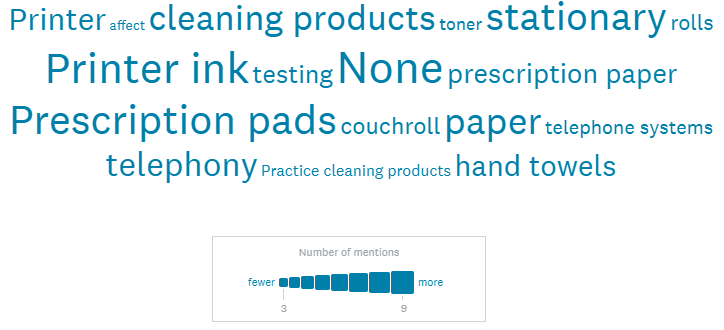EU Exit Planning: Non-Clinical Goods and Services
![]() Thank you for responding to our recent survey on practice needs in the event of a no-deal Brexit. We rely on your input.
Thank you for responding to our recent survey on practice needs in the event of a no-deal Brexit. We rely on your input.
Following a discussion at our Annual General Meeting on Thursday 24 January, we asked you about the impact of a no-deal EU exit on your practice-critical Non-Clinical Goods and Services (NCGS). Medical devices, clinical consumables and medicines are being considered separately.
We asked you to consider:
- The dependency of those goods/ services on that front-line service;
- The criticality of that front-line service and its clinical importance; and
- Outsourced services such as equipment maintenance.
We had a really good response and have been able to advise officials about supply concerns across London in good time. Whilst there were a number of respondents who are unconcerned about the impact of no-deal Brexit, those who do harbour concerns highlighted a number of non clinical products and services which they fear might be affected. These include:
- Stationary;
- Printer ink;
- Prescription pads;
- Couch roll;
- Paper;
- Telephony;
- Cleaning products;
- Prescription paper;
- Printer;
- Hand towels;
- Testing;
- Telephone systems;
- Practice cleaning products; and
- Toner.
We will continue to work with officials to identify and anticipate the impact of Brexit on London general practice, be it no-deal or otherwise. Other possible EU exit risks include:
- Goods or services that have supply chain touch points in the EU;
- Personal data held in EU member countries;
- Supply routes into the UK via Dover/ Calais; and
- Dependencies on EU regulations.
If you have any comments or questions about this work, please contact us.
This word cloud gives some indication of respondents' concerns.

London level Coronavirus response (23 Sep 2020)
We continue to provide an active voice for London general practice, working with the Mayor’s Office, London Assembly and London Councils to raise awareness of the needs of GP practices...NHS England guidance August and September 2020 (23 Sep 2020)
In the last four weeks a number of guidance documents have been issued by NHS England, we have collated them here for ease of reference: GMS contract changes...Important action: LMC advice re general practice workforce data report September 2020 (23 Sep 2020)
It is important that practices submit comprehensive workforce returns by the submission date of 30 September. It is crucial that workforce returns are as comprehensive as possible. Please include the...Tips of the month September 2020 (23 Sep 2020)
We provide weekly tips based on common queries which come through to us from London GPs and practice teams. These are shared via social media and collated for this newsletter....LMC and Board changes (23 Sep 2020)
Dr Dami Adedayo is stepping down as Londonwide LMCs’ Treasurer, Board Member and as chair of Barnet LMC. We would like to thank Dami for her service to practitioners, her...GP cancer care social media campaign (23 Sep 2020)
Throughout October we are launching social media videos showcasing the value of cancer care in general practice and showing how practices have been open and seeing patients throughout the pandemic. Thank...Response to DHSC Coronavirus vaccine regulation consultation (22 Sep 2020)
We have submitted the following organisational response to the Distributing vaccines and treatments for COVID-19 and flu consultation run by the Department of Health and Social Care. 1. Temporary authorisation of...NHS Test and Trace app QR codes (22 Sep 2020)
The NHS Test and Trace app launches on 24 September. Part of the system involves businesses displaying QR codes which can be read by the app, so users can easily allow...Digital first and APMS contracts (17 Sep 2020)
During summer 2020 there have been discussions about the possibility of creating new APMS contracts in areas deemed to be ‘under-doctored’ by NHS England and local commissioners. This follows on...Guidance
We provide expert guidance for practices in our guidance section, as well as an archive of other materials you may find useful.
GP Support
Contact our GP Support team if you need help or advice.
The team provide professional and pastoral support to GPs and practice teams on a broad range of issues.

